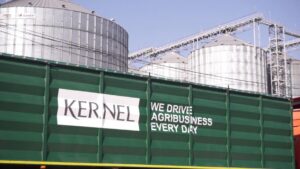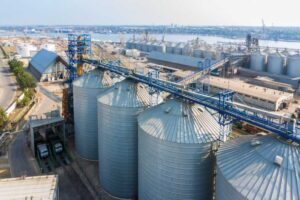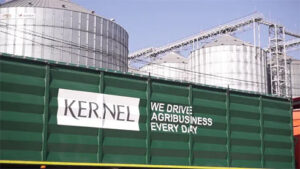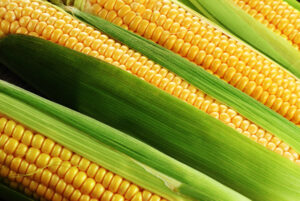
The Poltava Oil Extraction Plant (POEZ) of the Kernel agricultural holding has officially switched to renewable energy sources certified by the international organization Bureau Veritas Group, the company’s press service reported on Facebook.
According to the report, the agricultural holding will fully supply POEZ with renewable energy from sunflower husks, thereby reducing its dependence on fossil fuels and cutting greenhouse gas emissions by more than 11,000 tons per year. In addition, autonomous power generation will ensure continuity of production and reduce risks to food security.
“This is another step towards transforming Ukraine into a sustainable, energy-independent, and innovative country that knows how to turn agricultural resources into strategic advantages. Now our consumers can make an informed choice and contribute to the green recovery of the country’s economy by supporting a producer of certified sustainable oil,” Kernel emphasized.
It is specified that POEZ became the first company in Ukraine’s food sector to join the Science Based Targets Initiative (SBTi). In addition, it intends to support communities and supply surplus “green” energy to Ukraine’s power grid.
“This step is part of Kernel’s efforts to decarbonize and ensure climate resilience at every stage of our work: from the field to logistics,” the agricultural holding summarized.
The Poltava OEZ of the Kernel agricultural holding specializes in the production of sunflower oil under the Stozhar trademark. Previously, oil under this brand was produced in Vovchansk (Kharkiv region). With the start of the full-scale invasion of Ukraine by the Russian Federation, the work of the SEZ in Vovchansk was suspended and its capacities were transferred to the Poltava region. Before the war, the processing capacity of the Vovchansk SEZ was 330,000 tons of sunflower seeds per year. In turn, the Poltava SEZ is designed to process up to 430,000 tons of sunflower seeds per year and produces unrefined, refined, and hydrated vegetable oil, as well as meal.
Before the war, the Kernel agricultural holding company ranked first in the world in the production of sunflower oil (about 7% of world production) and its export (about 12%). It is one of the largest producers and sellers of bottled oil in Ukraine. In addition, it is engaged in the cultivation and sale of agricultural products.
In the first nine months of 2025, Kernel increased its net profit by 7% to $218 million, with revenue growing by 19% to $3.092 billion and EBITDA increasing by 4% to $398 million.

Kernel, one of Ukraine’s largest agricultural holdings, exported 1.6 million tons of grain in the third quarter of fiscal year 2025 (FY, third quarter – January-March 2025), down 15% from a year earlier.
According to the quarterly report on the company’s website, the decline in exports was due to limited domestic supply caused by a poor harvest in 2024 and lower stocks.
“Nevertheless, Kernel maintained its strong market position, accounting for 12% of Ukraine’s total grain and oilseed exports in the first nine months, with total volumes reaching 4.4 million tons,” the report said.
According to the agricultural holding, the export terminal’s throughput capacity in the third quarter of fiscal year 2025 was 2.5 million tons, up 2% from the previous year, including 1.8 million tons of grain, 0.3 million tons of edible oil, and 0.4 million tons of vegetable meal.
Total throughput for the nine months of fiscal year 2025 increased by 65% compared to the previous year to 7.3 million tons, thanks to smooth export operations and a low base of comparison with fiscal year 2024, when exports were interrupted at the beginning of the season.
Grain receipts at elevators in the third quarter of fiscal year 2025 amounted to 91 thousand tons, reflecting typical seasonal dynamics. This brought the total receipts for the nine months of fiscal year 2025 to 2.7 million tons, down 2% from the previous year.
Of this volume, the agricultural holding’s own segment provided 1.5 million tons, with the remainder purchased from third parties.
The infrastructure and trade segment recorded EBITDA of $62 million for January-March 2025, representing a decrease of 46% year-on-year and 21% quarter-on-quarter. Of this total, the trading business provided $26 million, unchanged from the previous year, while Kernel’s grain and edible oil export value chain in Ukraine generated $36 million, down 59% year-on-year.
Before the war, Kernel was the world’s leading producer of sunflower oil (about 7% of global production) and its exporter (about 12%). It is one of the largest producers and sellers of bottled oil in Ukraine. In addition, it is engaged in the cultivation and sale of agricultural products.
In the first nine months of 2025, Kernel increased its net profit by 7% to $218 million, with revenue growing by 19% to $3.092 billion, and its EBITDA increased by 4% to $398 million.

Kernel, one of Ukraine’s largest agricultural holdings, reported net income of $41 million in the third quarter of fiscal year 2025 (January-March 2025), compared with $101 million in the same period of fiscal year 2024.
According to the quarterly report published on the company’s website, Kernel’s consolidated revenue in the third quarter of FY 2025 reached $1.145 billion, up 14% compared to the same period last year, but remained at the previous quarter’s level.
“These results were achieved thanks to high sales prices, and the increase in grain exports offset the decline in revenues from the sale of bottled oil,” the company explained.
The group’s sales expenses increased by 27% compared to the same period last year, to $984 million, due to higher raw material costs and reflecting increased competition for raw materials and supply constraints.
Gross profit for the third quarter of fiscal year 2025 was $137 million, down 34% from the same period last year, reflecting lower margins in the oilseed processing and infrastructure and trading segments.
Kernel also notes that during the reporting period, the company’s EBITDA amounted to $110 million, which is 6% less than in the previous quarter and 31% less than in the previous year. At the same time, the oilseed processing segment generated EBITDA of $36 million, down 26% from the previous year, due to lower sales volumes and margin compression as a result of a relatively low sunflower seed harvest in Ukraine.
EBITDA for the Infrastructure and Trade segment fell by 46% compared to the same period last year, to $62 million, of which $26 million was generated by Avere’s trading activities, and the remaining $36 million was earned from the value chain of grain and edible oil exports in Ukraine, The main factors affecting the results were export terminals and grain trading operations.
It is noted that in the third quarter of fiscal year 2025, the Agriculture segment recorded EBITDA of $34 million, 2.1 times more than last year. This figure also includes non-cash losses of $24 million related to the revaluation of biological assets, compared to losses of $25 million last year.
According to the report, cash inflows from investing activities amounted to $25 million (in the third quarter of 2024, there was an outflow of $127 million), mainly reflecting $46 million in proceeds from the sale of financial assets previously used to manage excess liquidity, while $19 million was used to purchase fixed assets.
Kernel notes that during the reporting period, after the peak of working capital financing, it repaid a significant portion of its debt, including full repayment of its debt to the EBRD and pre-export financing for sunflower oil, as well as early repayment of part of its outstanding debt to the EIB.
As a result, during January-March 2025, the group’s debt obligations decreased by $190 million to $755 million. In addition, the company received an extended waiver from one of its long-term lenders, which is valid until June 30, 2026.
This allowed Kernel to reclassify them as non-current liabilities, which improved financial stability. As of March 31, 2025, the group’s cash balance was $549 million, down 11% from the previous quarter. This led to a 37% reduction in net debt on a quarterly basis to $206 million.
The company also notes that for the third quarter of 2025, commodity inventories decreased by 16% to $371 million as of March 31, 2025.
The report also indicates that for the first nine months of this fiscal year, Kernel increased its net profit by 7% to $218 million, with revenue growing by 19% to $3.092 billion, and EBITDA increasing by 4% to $398 million.
Before the war, Kernel was the world’s leading producer of sunflower oil (about 7% of global production) and its exporter (about 12%). It is one of the largest producers and sellers of bottled oil in Ukraine. In addition, it is engaged in the cultivation and sale of agricultural products.

Kernel, one of Ukraine’s largest agro-industrial groups, a leading grain exporter from Ukraine, and a global leader in the production and export of sunflower oil, has received Ukraine’s first commodity agricultural note, the agro-holding’s press service reported on its website.
According to the report, the document was registered in the Register of Agricultural Notes with the support of PJSC National Depository of Ukraine (NDU), the official administrator of the system.
The commodity agricultural note was deposited with the Central Securities Depository, which ensures its legal status and high liquidity. Thanks to this, the instrument can be used as a reliable collateral in financial transactions and as an alternative to traditional agricultural financing mechanisms, the agricultural holding explained.
“We see the future in the digitization and standardization of processes. The use of agricultural notes is not just a tool, but a foundation for transparent and effective interaction between participants in the agricultural market. We are confident that this decision will allow us to flexibly and quickly support our partners, especially in today’s difficult market conditions,” emphasized Alexander Golovin, Commercial Director for Ukraine at Kernel.
The agricultural note was issued with the support of the IFC project “Developing Ukraine’s Agricultural Sector Access to Capital Markets,” which is being implemented in partnership with the Swiss Confederation. The initiative aims to expand access to finance for agricultural producers by strengthening the agricultural receipt instrument and preparing agricultural notes as a fully-fledged asset class for securitization.
“We sincerely believe that agricultural notes will become one of the key lending instruments for the agricultural sector, especially for covering working capital needs and attracting financing from capital markets,” said IFC Project Manager Kirill Mukhomedzyanov.
“An instrument such as a commodity agricultural note provides high legal transparency and reduces the cost of financing for agricultural producers, which is particularly valuable for small and medium-sized farmers with limited access to investment. Accordingly, in the long term, the use of notes will help boost investor and bank confidence in the sector and allow for free market circulation, opening up new sources of capital,” emphasized Kernel’s head of agribusiness finance, Mykhailo Golubakha.
The agricultural holding emphasized that the launch of agricultural notes is a manifestation of the company’s strategic course towards the digitalization of business processes.
Before the war, Kernel was the world’s leading producer of sunflower oil (about 7% of global production) and its exporter (about 12%). It is one of the largest producers and sellers of bottled oil in Ukraine. In addition, it is engaged in the cultivation and sale of agricultural products.

“Kernel, one of the largest Ukrainian agro-industrial groups, processed 845 thsd tonnes of oilseeds in the third quarter (January-March) of the financial year (FY) 2024/25, up 3% y-o-y, but down 9% q-o-q, according to the agroholding’s report.
According to the report, in January-March 2025, Kernel processed 694 thousand tons of sunflower seeds and, due to the lack of raw materials in the domestic market of Ukraine, also processed 151 thousand tons of soybeans at three plants. In addition, the agroholding processed 50 thou tons of sunflower seeds under tolling agreements with third parties.
As a result of processing of both sunflower seeds and soybeans in the third quarter of 2024/25, the agricultural holding’s edible oil sales fell by 9% year-on-year to 347 thsd tonnes. At the same time, sales of edible oil in the first nine months of FY2025 amounted to 1 mln tons, which is 6% less than in the same period last year.
The report also notes that grain supplies to the agricultural holding’s elevators decreased by 2% to 2.7 million tons in the first nine months of FY2025.
“In the third quarter of FY 2024/25, Kernel reduced grain exports by 15% to 1.6 mln tonnes compared to the same period last year, which it explained by the decline in the harvest in Ukraine. In total, Kernel exported 4.4 mln tons of grains and oilseeds in the first nine months of the year, accounting for 12% of the national exports.
Transshipment through the agricultural holding’s export terminals reached 2.5 million tons in the third quarter, up 2% year-on-year. This volume included 1.8 mln tons of grains, 0.3 mln tons of edible oil, and the rest was made up of oilseeds.
In total, for the first nine months, the transshipment volume amounted to 7.3 mln tons, up 65% year-on-year, due to the low comparison base in FY 2024/25 due to the closure of the Black Sea ports at the beginning of the season, the agricultural holding summarized.
Kernel is the world’s largest exporter of sunflower oil, one of the largest producers and sellers of bottled oil in Ukraine. In addition, it is engaged in the cultivation and sale of agricultural products.
In the first nine months of 2024, the agricultural holding reduced its net profit by 53% to $204 million, while its revenue decreased by 4% to $2.595 billion, and its EBITDA decreased by 36% to $384 million.

“Kernel, one of Ukraine’s largest agricultural holdings, intends to strategically adjust its crop mix for the 2025 harvest during the spring sowing campaign to align with its more sustainable practices that were maintained before the full-scale war in Ukraine.
According to the quarterly report published on the company’s website on Friday, Kernel plans to allocate about 168 thousand hectares for corn, which is twice as much as in the 2024 season and will account for 49% of its total production area.
At the same time, the agroholding plans to reduce sunflower acreage by 34%, to 44 thou hectares (or 13% of the crop structure). The agricultural holding explained this decision by further optimizing land use and restoring long-term agronomic sustainability.
“In 2025, Kernel will also reduce its soybean acreage to 27 thou hectares, while a year earlier it had 72 thou hectares under soybeans.
“As of the date of the report, winter crops – including 95 thou hectares of winter wheat and 3.45 thou hectares of rapeseed – are in generally good condition, with no significant risks beyond the usual seasonal factors at this stage,” the agricultural holding summarized.
Kernel is the world’s largest exporter of sunflower oil, one of the largest producers and sellers of bottled oil in Ukraine. In addition, it is engaged in the cultivation and sale of agricultural products.
In FY2024, Kernel’s net profit decreased by 44% compared to FY2023 to $167.95 million, while revenue increased by 4% to $3.581 billion and EBITDA decreased by 30% to $381 million.